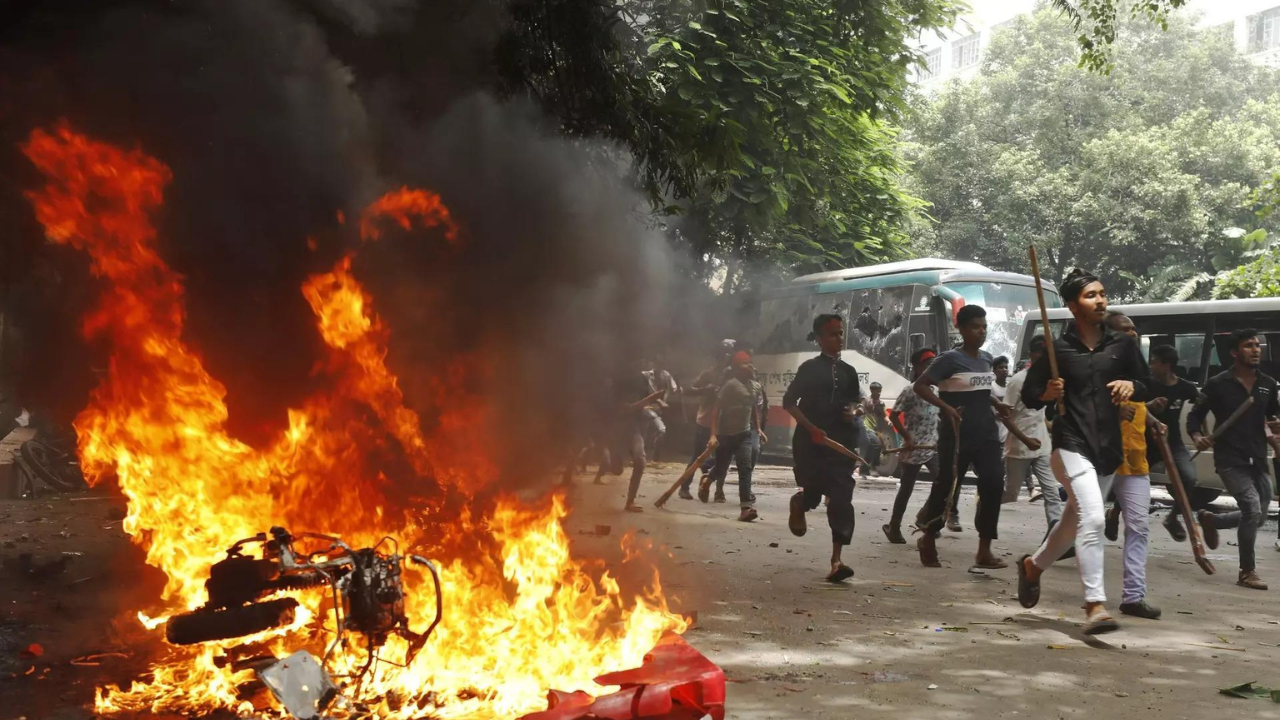[ad_1]
DHAKA: Nearly 100 people were killed and hundreds more injured Sunday as renewed anti-government protests swept across Bangladesh, with protesters calling for the prime minister to resign, and PM Sheikh Hasina accusing them of “sabotage” and cutting off mobile internet in a bid to quell the unrest.
The country’s leading Bengali-language newspaper, Prothom Alo, said at least 97 people, including at least 14 police officers, died in the violence.Channel 24 reported 85 deaths.
The military announced that a new curfew, including in the capital, Dhaka, and other divisional and district headquarters, was in effect Sunday evening for an indefinite period. The government had earlier imposed a curfew with some exceptions in Dhaka and elsewhere. The govt also mobilised troops, paramilitary border guards BGB, and elite anti-crime Rapid Action Battalion alongside police.
Demonstrators are demanding Hasina’s resignation following protests last month that began with students calling for an end to a quota system for govt jobs. Those demonstrations escalated into violence that left over 200 dead. As the renewed violence raged, Hasina said the protesters who engaged in “sabotage” and destruction were no longer students but criminals. “People should deal with them with iron hands.”
The governing Awami League party said the demand for Hasina’s resignation showed that the protests have been taken over by the main opposition Bangladesh Nationalist Party and the now-banned Jamaat-e-Islami party. Also Sunday, the govt announced a holiday from Monday to Wednesday. Courts were to be closed indefinitely. Mobile internet service was cut off, and Facebook and messaging apps, including WhatsApp and Instagram, were inaccessible. Junior minister for I&B Mohammad Ali Arafat said the services were severed to help prevent violence.
At least 11,000 people have been arrested in recent weeks. The unrest has also resulted in the closure of schools and universities across the country, and authorities at one point imposed a shoot-on-sight curfew.
Protesters called for a “non-cooperation” effort, urging people not to pay taxes or utility bills and not to show up for work on Sunday, a working day in Bangladesh. Offices, banks and factories opened, but commuters in Dhaka and other cities faced challenges getting to work. Th demonstrators attacked Bangabandhu Sheikh Mujib Medical University, a major public hospital in Dhaka, torching several vehicles.
Video footage showed protesters vandalising a prison van in the chief metropolitan magistrate’s court in Dhaka. Other videos showed police opening fire on the crowds with bullets, rubber bullets and tear gas. The protesters set fire to vehicles and Awami League’s offices. Some carried sharp weapons and sticks. In Dhaka’s Uttara neighbourhood, police fired tear gas to disperse hundreds of people who blocked a major highway. Protesters attacked homes and vandalised a community welfare office in the area, where Awami activists took up positions. Some crude bombs were detonated, and gunshots were heard, witnesses said. At least 20 people were hit by bullets in the area.
The country’s leading Bengali-language newspaper, Prothom Alo, said at least 97 people, including at least 14 police officers, died in the violence.Channel 24 reported 85 deaths.
The military announced that a new curfew, including in the capital, Dhaka, and other divisional and district headquarters, was in effect Sunday evening for an indefinite period. The government had earlier imposed a curfew with some exceptions in Dhaka and elsewhere. The govt also mobilised troops, paramilitary border guards BGB, and elite anti-crime Rapid Action Battalion alongside police.
Demonstrators are demanding Hasina’s resignation following protests last month that began with students calling for an end to a quota system for govt jobs. Those demonstrations escalated into violence that left over 200 dead. As the renewed violence raged, Hasina said the protesters who engaged in “sabotage” and destruction were no longer students but criminals. “People should deal with them with iron hands.”
The governing Awami League party said the demand for Hasina’s resignation showed that the protests have been taken over by the main opposition Bangladesh Nationalist Party and the now-banned Jamaat-e-Islami party. Also Sunday, the govt announced a holiday from Monday to Wednesday. Courts were to be closed indefinitely. Mobile internet service was cut off, and Facebook and messaging apps, including WhatsApp and Instagram, were inaccessible. Junior minister for I&B Mohammad Ali Arafat said the services were severed to help prevent violence.
At least 11,000 people have been arrested in recent weeks. The unrest has also resulted in the closure of schools and universities across the country, and authorities at one point imposed a shoot-on-sight curfew.
Protesters called for a “non-cooperation” effort, urging people not to pay taxes or utility bills and not to show up for work on Sunday, a working day in Bangladesh. Offices, banks and factories opened, but commuters in Dhaka and other cities faced challenges getting to work. Th demonstrators attacked Bangabandhu Sheikh Mujib Medical University, a major public hospital in Dhaka, torching several vehicles.
Video footage showed protesters vandalising a prison van in the chief metropolitan magistrate’s court in Dhaka. Other videos showed police opening fire on the crowds with bullets, rubber bullets and tear gas. The protesters set fire to vehicles and Awami League’s offices. Some carried sharp weapons and sticks. In Dhaka’s Uttara neighbourhood, police fired tear gas to disperse hundreds of people who blocked a major highway. Protesters attacked homes and vandalised a community welfare office in the area, where Awami activists took up positions. Some crude bombs were detonated, and gunshots were heard, witnesses said. At least 20 people were hit by bullets in the area.
[ad_2]
Source link



